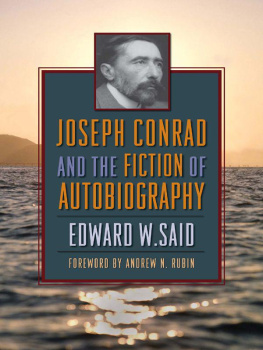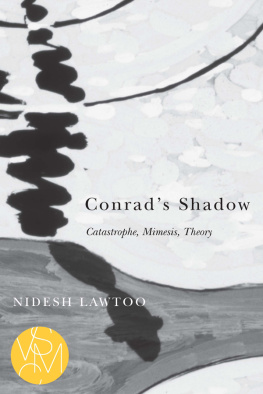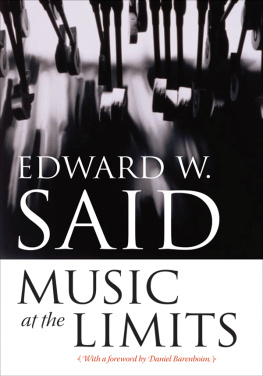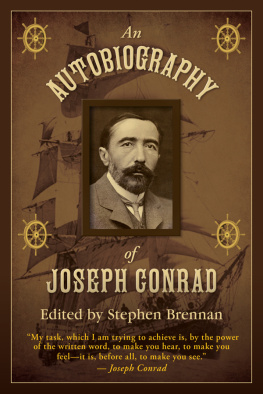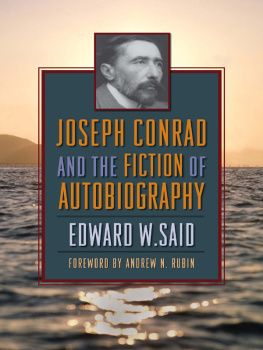Joseph Conrad and the Fiction of Autobiography
Joseph Conrad and the Fiction of Autobiography
Edward W. Said
Columbia University Press
New York
Columbia University Press
Publishers Since 1893
New York Chichester, West Sussex
cup.columbia.edu
Copyright 2008 Edward W. Said
Copyright 1966 by the President and Fellows of Harvard College
All rights reserved
E-ISBN 978-0-231-51154-4
Library of Congress Cataloging-in-Publication Data
Said, Edward W.
Joseph Conrad and the fiction of autobiography / Edward W. Said.
p. cm.
Includes bibliographical references and index.
ISBN 978-0-231-14004-1 (cloth : alk. paper)ISBN 978-0-231-14005-8 (pbk.)ISBN 978-0-231-51154-4 (electronic)
1. Conrad, Joseph, 18571924Criticism and interpretation. 2. Autobiographical fiction, EnglishHistory and criticism. I. Title.
PR6005.O4Z792 2008
823'.912dc22
2007030511
A Columbia University Press E-book.
CUP would be pleased to hear about your reading experience with this e-book at .
TO MY PARENTS
Contents
O F ALL THE AUTHORS to whom Edward Said gravitated constantly throughout his career as a literary critic, Joseph Conrad was, as he remarks, like a cantus firmus, a steady ground bass to much that I have experienced. No one, he writes, could represent the fate of lostness and disorientation better than Conrad did, and no one was more ironic about the effort of trying to replace that condition with arrangements and accommodations.
On the face of it, there is a great deal in Joseph Conrads life with which Said could identify. Both were born and lived under the dictates of foreign or colonial rule. Driven out of their native homelands, the two wrote in a language that was not their native tongue. They shared the unsettling experiences of dislocation, exile, and marginalization. Caught in the disjuncture between two worlds (the disappearing anciens rgimes or colonial worlds from which they were displaced and the new, unfamiliar, and uncertain worlds where they would arrive and would ultimately remain), their cultural and political uprooting demanded, to echo Said, adjustments and certain arrangements and accommodations. Their exile afforded both Said and Conrad a remarkable acuity to comprehend the diversity, variety, and particularity of human experience while being conscious of its exclusions, its silences, and its prejudices. And in many respects, the condition of exile expanded their consciousness even more broadly; in their awareness of at least two cultures, their diversity of vision gave rise to an awareness of simultaneous dimensions, an awareness that [was] contrapuntal.
Yet the similarities of their experiences are far less important to Said as critic than the trajectory of their lives would suggest.
Joseph Conrad and the Fiction of Autobiography, Saids revision of his dissertation originally written under the supervision of Monroe Engel and Harry Levin at Harvard University, is a phenomenological exploration of Conrads consciousness. It is a sustained and rigorous examination of how Conrads short fiction is mediated and then reinforced by his letters, which G. Jean-Aubury had edited and published in 1927, three years after Conrads death. The examination of Conrads letters is not, however, an effort to relate the lived realities of the writer to his work, reducing the narrative of Conrads life to the narratives of his short fiction. Rather, Said uses the dynamic between the letters and Conrads short fiction to investigate the conditions that express the menacing ambiguities and peculiarly unsettling overtones of his literature. If the letters represent Conrads tormented relationship to himselfone mediated by the problem of languagethey elaborate the inexplicable tensions and complex literary forces in his short fiction.
His letters (the most fascinating being those to the writer Robert Cunninghame Graham) portray Conrad in an embattled self-conflict from which he is entirely incapable of deriving any meaning at all. They repeatedly express his frustrations with the inadequacy of words, their slippages of meaning, and the overall inability of language to circumscribe or fully enclose experience in a word or phrase. He tells his friend Arthur Symons how he is quarrying his English out of some dark pit. For Conrad, writing happensif it happens at allin the presence of nothing in particular and in the absence of everything in general. The demand to write, write, write becomes the nearly absurd necessity to render this contradiction visible or spoken. Literary activity is essentially a process of capturing the particularity of words that disappear in a spectral opacity before they may be briefly embodied in any form at all.
The representation of the discrepancy between the subject of language and the object of writing is in essence a crisis in mimesis, whose only ironic solution is the willful exertion of various arrangements and accommodations. If the world is a conflict of willful egoism, Said writes,
then the need for recognition is the original egoism, the root from which everything else springs. In seeking the kinship of reflective understanding however, the performer of an action inevitably is forced to reduce himself to a level below the normal limits of active human life. There is a draining of strength as the past action is sapped of all content by the reflecting present. Only the surrounding darkness remains substantially palpable. In the present the corroding power of thought and interpretation completely absorbs the actualized situation and leads to an anarchic enlargement of the self. The mute, or nearly mute, agent who wishes himself fully understood grows more simple and direct, becomes less accessible to the complex reflecting mind. And the reflecting, enervated mind, desiring relief in action, becomes even more complex, less and less able to grasp things as they are.
Saids emphasis on this phenomenological preoccupation (being condemned to meaning) and the existential predicament (being condemned to living) provides the coordinates of an antinomy (an opposition between an embattled subject and a dynamic object) that gets transposed onto the works themselves. He designates three distinct phases in Conrads literary development: 1896 to 1913 (from his decision to become a writer to his recognition as a writer); 1914 to 1918 (the turmoil of war and the dissolution of the anciens rgimes); and finally 1918 to 1924 (when Conrad, like Europe, underwent an uneasy reconciliation).
Once he re-coordinates Conrad in the conjunctures of these sociohistorical processes, the active interplay between the letters and the short fiction discloses patterns precisely because the antinomy strengthens Saids capacity to describe and analyze Conrads literary procedures and narrative strategies. Thus, in Conrads early short fiction, there is a motivated attempt to comprehend an action that, at the time of its inexplicable occurrence, intransigently resists thought. Generally speaking, the stories record illusions, but the true meaning behind them is never supplied, except in the enigmatic form of reported speech: the horror, the horror.
Nowhere are the implications of Saids first examination of Conrads techniques more powerfully expressed than in his later interpretation, Two Visions of Heart of Darkness, in Culture and Imperialism

